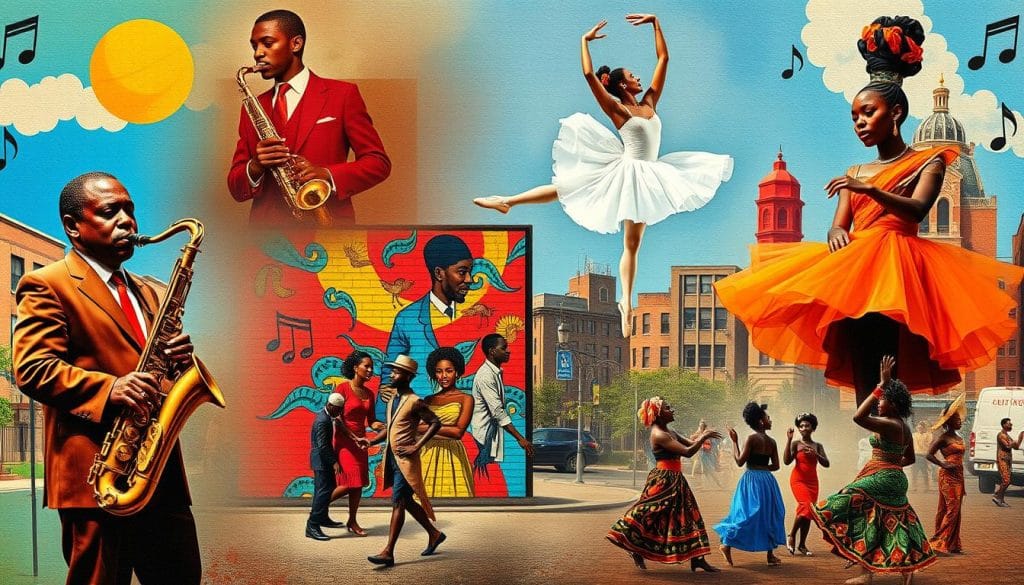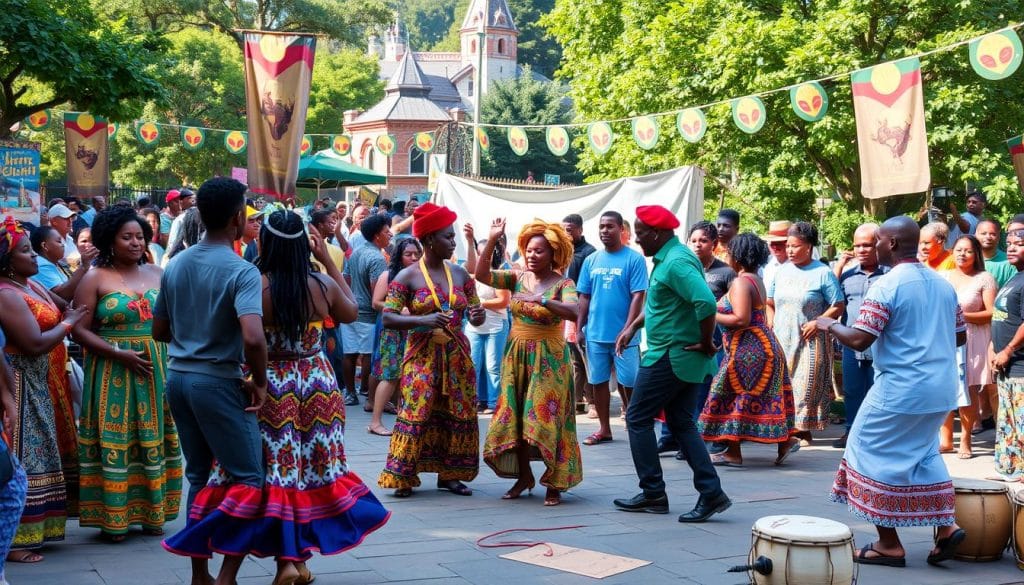73% of Americans think Black History Month is key to understanding American history. But, only 22% of schools teach Black history all year. This shows we need to learn about Black culture all year, not just in February.
Black Culture Legacy is deeply connected to African American heritage. It shapes America’s identity and helps it grow.
Black History Month is more than just a month. It celebrates the big impact Black culture has on American society. By looking at important figures and stories, we learn more about Black History Month. We see how it matters to America today, especially for Diversity, Equity, and Inclusion.
Key Takeaways
- Black History Month is crucial for understanding American history
- Black Culture Legacy is deeply connected to African American heritage
- The impact of Black culture extends beyond February
- Key historical figures and untold stories are essential to understanding Black History Month
- Diversity, Equity, and Inclusion are vital in modern society
- Black culture has significantly contributed to American society
Understanding the Foundations of Black Culture Legacy
Black culture is rich and diverse, shaped by history, struggle, and resilience. It’s about keeping Cultural heritage preservation alive and celebrating Black excellence. It includes music, art, literature, and traditions passed down through generations.
The Black history influence on American culture is clear. From slavery to today, Black people have greatly contributed to the country. Knowing this history helps us see the value of Black culture and its role in American society.
Defining Black Culture and Its Elements
Black culture is complex and can’t be summed up by one thing. It includes:
- Music: From jazz to hip-hop, Black music has shaped American culture.
- Art: Black artists have made big impacts in art, from painting to sculpture.
- Literature: Black writers have created some of America’s most iconic works, like novels and poetry.
Historical Roots of Black Identity
The history of Black identity is complex. It involves the slave trade, the Civil War, and the Civil Rights Movement. Knowing these events helps us understand the importance of Black culture in America.
By preserving and celebrating Black culture, we can build a more inclusive society. This can happen through Cultural heritage preservation efforts. We can support Black-owned businesses, learn from educational resources, and push for DEI initiatives.
| Element of Black Culture | Significance |
|---|---|
| Music | Driving force in American culture |
| Art | Significant contributions to the world of art |
| Literature | Iconic works of American literature |
Influence of African American Arts on American Culture
African American arts have deeply influenced American culture. They have shaped the nation’s music, literature, and visual arts. The legacy of Black culture is seen in traditions passed down through generations. From the blues to hip-hop, Black music has greatly influenced American sound.
The impact of African American arts is seen in many forms of expression. Notable authors like Langston Hughes and Zora Neale Hurston have enriched American literature. Artists such as Jacob Lawrence and Romare Bearden have expressed the experiences of Black Americans through their work.

Some key examples of African American arts and their influence include:
- Music: Jazz, blues, and hip-hop have all originated from African American communities. They have significantly impacted American music.
- Literature: Works by African American authors offer a unique perspective on the American experience. They have helped shape the nation’s literary canon.
- Visual Arts: African American artists have used their work to express the struggles and triumphs of Black Americans. This provides a powerful visual representation of the legacy of Black culture.
The African diaspora traditions have played a significant role in shaping American culture. By understanding and appreciating these traditions, we can gain a deeper understanding of the legacy of Black culture. This understanding helps us see its ongoing influence on American society.
| Art Form | Influence on American Culture |
|---|---|
| Music | Shaped American sound, influenced genres such as jazz and hip-hop |
| Literature | Provided unique perspective on American experience, shaped literary canon |
| Visual Arts | Expressed struggles and triumphs of Black Americans, provided powerful visual representation |
The Role of Black Leaders in American History
Black leaders have greatly shaped American history. They have left a lasting historical impact of Black culture that still affects us today. These individuals have battled for equality, justice, and freedom.
Key Figures Who Changed the Course of History
Names like Martin Luther King Jr., Rosa Parks, and Malcolm X are linked to the civil rights movement. Their efforts have greatly enriched the Black Culture Legacy. They inspire others to keep fighting for equality.
Modern Leaders and Their Impact
Today, figures like Barack Obama, Oprah Winfrey, and LeBron James are making big differences. They are building on the historical impact of Black culture. Their work shows the lasting power of Black culture in American history.
Celebrating Black Achievements Year-Round
Celebrating Black achievements is key to a more diverse and inclusive world. By honoring African American heritage, we create a welcoming space. Events like Black History Month and Martin Luther King Jr. Day are important.
Valuing African American heritage boosts workplaces, schools, and social progress. It brings new ideas and better choices. It also motivates others to aim high, building a culture of success.

To honor Black excellence, learn about African American history and culture. Attend cultural events, read books by Black authors, and explore Black art and music. This way, we appreciate the big role African Americans play in our society.
Notable Events and Months to Celebrate
- Black History Month (February)
- Martin Luther King Jr. Day (third Monday in January)
- Juneteenth (June 19th)
- African American Music Appreciation Month (June)
By celebrating these events and months, we support diversity and inclusion. We also honor African American heritage and culture. This makes our society more welcoming and fair for everyone.
| Event/Month | Purpose |
|---|---|
| Black History Month | To recognize the significant contributions and achievements of African Americans |
| Martin Luther King Jr. Day | To honor the life and legacy of Martin Luther King Jr. and his role in the civil rights movement |
| Juneteenth | To commemorate the emancipation of enslaved African Americans in the United States |
The Importance of Education in Preserving Black Culture
Education is key in keeping Black culture alive. It lets future generations see how Black history influence has shaped America. By teaching Black history in schools, students learn about the Legacy of Black culture and its role in the country’s history.
Incorporating Black History into School Curricula
To keep Black culture alive, we must teach Black history in schools. Here’s how:
- Make lesson plans for kids that focus on important Black history figures and events.
- Use documentaries and books to teach a full picture of Black culture.
- Start discussions and debates on why Black history matters and its impact on America.
Resources for Learning and Teaching
There are many ways to learn and teach about Black history and culture. Some great resources include:
- National Museum of African American History and Culture
- Black History Month educational kits
- Online courses and webinars on Black history and culture
By using these resources and teaching Black history in schools, we help future generations value the Black history influence and the Legacy of Black culture in America.
Black Culture Legacy in Film and Television
The film and television industry owes a lot to African diaspora traditions. Groundbreaking films and the push for representation show Black culture’s big role in American media.
Films like “Roots” and “12 Years a Slave” highlighted African American struggles. They educated viewers and started important talks on racism and inequality.
Groundbreaking Films That Changed Perspectives
- “Roots” (1977) – a miniseries that explored the experiences of African Americans during the slave trade
- “12 Years a Slave” (2013) – a film based on the true story of Solomon Northup, a free Black man who was kidnapped and sold into slavery
- “Moonlight” (2016) – a film that explored the experiences of a young Black man growing up in Miami
Representation and Its Importance
Seeing diverse faces on screen is key for a more inclusive media. It helps break down stereotypes and fosters understanding.
The importance of representation cannot be overstated. It has the power to shape our perceptions and attitudes towards different cultures and communities.
In conclusion, Black culture’s impact on film and TV is vast and meaningful. By pushing for more diversity, we can make media more inclusive and fair for everyone.
The Intersection of Black History and Civil Rights
Black Culture Legacy and African American heritage have shaped the civil rights movement in the U.S. The fight for equality has been long and hard. Key events have paved the way for future generations.
Landmark Events in the Fight for Equality
Important events include the Montgomery Bus Boycott, the March on Washington, and the Civil Rights Act of 1964. These have helped advance Black Culture Legacy and African American heritage. They promote equality and justice for everyone.
Ongoing Challenges and Activism
Despite progress, challenges like racial inequality, police brutality, and voter suppression remain. It’s vital to keep fighting for equality. We must honor the legacy of Black Culture Legacy and African American heritage.
To bring about change, understanding Black Culture Legacy and African American heritage is key. By learning from history and acknowledging the ongoing struggle, we can strive for a more just society.
- Support organizations that promote Black Culture Legacy and African American heritage
- Participate in activism efforts, such as protests and advocacy campaigns
- Educate yourself and others about the importance of equality and justice
Together, we can build a brighter future. One that respects the legacy of Black Culture Legacy and African American heritage.
| Event | Year | Significance |
|---|---|---|
| Montgomery Bus Boycott | 1955-1956 | Spark for the civil rights movement |
| March on Washington | 1963 | Civil rights advocacy and awareness |
| Civil Rights Act of 1964 | 1964 | Landmark legislation for equality and justice |
The Global Impact of Black Culture
Black culture has made a big impact worldwide. It goes beyond the United States. Preserving cultural heritage is key to understanding Black history’s global importance.
Through ideas, art, and music, Black culture has changed how we think and create. It has shaped our expressions and ways of life.
Preserving cultural heritage is very important. It lets us learn from the past and value Black culture’s global contributions. By recognizing Black history’s influence, we can build a more inclusive society.
This is especially true for Diversity, Equity, and Inclusion (DEI) efforts. These initiatives promote understanding and collaboration across cultures.
How African Influences Shaped Global Culture
African influences have deeply shaped global culture. Many countries have adopted African music, art, and traditions. The African diaspora has greatly influenced music in Brazil, Cuba, and the United States.
This exchange of ideas and practices has enriched our global culture. It shows the importance of preserving cultural heritage.
Cross-Cultural Collaborations
Cross-cultural collaborations have boosted Black culture and preserved its heritage. Artists, musicians, and writers from different backgrounds have come together. This has given us a deeper understanding of the Black experience and its global impact.
By embracing our differences and celebrating our shared humanity, we can build a more inclusive society. In this society, Black history’s influence is recognized and valued.
The Future of Black Culture Legacy
The legacy of Black culture and African diaspora traditions shapes our world today. It’s vital to keep these traditions alive for the next generation. New voices and trends in music, art, literature, and film are key to the future of Black culture.
Here are some ways to support the future of Black culture:
- Supporting Black-owned businesses and initiatives
- Engaging with educational resources and workshops
- Advocating for diversity, equity, and inclusion (DEI) initiatives in everyday life
By supporting these efforts, we ensure Black culture thrives and inspires future generations. As African diaspora traditions evolve, preserving and celebrating them is crucial. This can be done through community involvement, cultural events, and education.
It’s important to recognize the legacy of Black culture and its global impact. This recognition helps us strive for a future where Black culture is valued and celebrated.
The future of Black culture legacy relies on our collective efforts. Together, we can build a brighter future for generations to come.
| Initiative | Goal | Impact |
|---|---|---|
| Supporting Black-owned businesses | Promote economic empowerment | Strengthen Black communities |
| Engaging with educational resources | Preserve African diaspora traditions | Educate future generations |
| Advocating for DEI initiatives | Promote diversity and inclusion | Foster a more equitable society |
How to Support and Engage with Black Culture
Reflecting on Black culture’s deep historical impact, it’s key to find ways to support its legacy. One strong way is to join in community events that celebrate Black excellence.
Community Involvement and Local Events
Look for local Black-owned businesses and cultural centers. They host events that honor Black history and traditions. By attending festivals, art exhibits, and workshops, you can dive into the rich Black Culture Legacy.
Online Resources and Networks
Use online platforms to amplify Black voices. Follow social media, podcasts, and websites that showcase Black contributions. Join online communities for discussions on the historical impact of Black culture and how to support the Black Culture Legacy.
